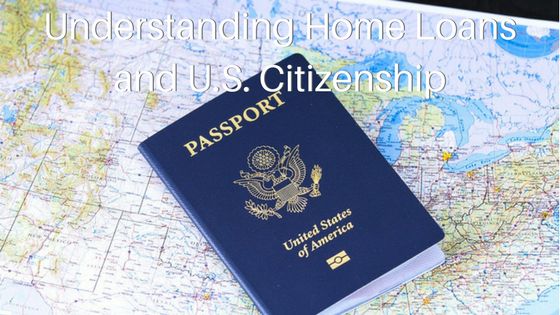Owning a home is one of the pillars of the American dream. This goes for people who can trace a lineage to the American Revolution, as well as people who just arrived from their native country.
However, it’s often believed that securing a loan in the United States is for established U.S. citizens only. Many think that if you want to own property in the United States but you’re a non-resident, you’ll have to purchase it entirely out of pocket.
The numbers, however, disprove this theory.
According to the National Association of REALTORS (p. 21), 41% of all properties purchases by foreign buyers used a mortgage loan from a U.S.-based lender. This tells us that it certainly is possible for people from all over the globe to secure financing in the United States.
But we won’t sugar coat it. For non-U.S. citizens, the process can be lengthy and more complicated. With the right documents and the right credit history, however, you have an excellent chance at getting the loan you need.
Your Citizenship Guide to Home Loans
The Challenges of Approval for Non-U.S. Citizens
So why are there so many challenges for non-U.S. citizens? It has a lot to do with the way mortgages are processed in this country. To be more specific, it has to do with credit scores. In the United States, we have a well-established process of using credit scores to gauge the creditworthiness of potential borrowers. The process begins, virtually without the effort of consumers, as they take out loans, make car payments, and pay their bills.
Foreign citizens, of course, are not involved in the process. This means that as far as the U.S. credit agencies are concerned, there is no credit history. Some countries have their own credit system, but many have none at all.
Because there is no U.S. credit score for non-U.S. citizens, lenders have to verify creditworthiness using different methods, which often means more documents, more forms, and potentially more collateral.
U.S. Citizens
To give you a basic comparison, let’s look at the requirements for U.S. citizens. If you are a verified citizen, all you need is your valid Social Security number to start the process.
Permanent Resident Aliens
As a permanent resident alien, you will have a slightly easier process for securing a loan compared to other non-citizens. Loans are allowed under the same terms as U.S. citizens, and you’ll need to bring your valid Social Security number. However, you will also need to provide documentation that proves your residency. Also, the Permanent Resident Alien certification must be completed, and the lender will need to include this document in the loan files. With these documents, you should be able to start the process towards a mortgage loan. As we’ll soon discover, this is extremely simple compared to the complex process for non-permanent resident aliens.
Non-Permanent Resident Aliens
Although non-permanent resident aliens are eligible for financing under the same terms as U.S. citizens, there is a lot more involved in the process. You’ll need to provide your Social Security number, and you must have an established credit history with U.S. credit agencies. If there aren’t enough U.S. trade lines established, it is possible to reference credit information from certain foreign countries. If this is the case, the loan will be qualified as an “A” credit.
To be eligible, you will need to be employed in the United States, and your source of income must be verified with the appropriate documents. You’ll also have to provide some form of verification that the work is expected to continue for at least another three years. You’ll also have to have a two-year work history, which may or may not include employment in a foreign country. As always, be prepared to provide documentation for this work-history information.
For home loans to non-permanent resident aliens, a tax information number is not acceptable, but a specific visa is required.
Visas that may be required include:

- E-1: For treaty traders and qualified employees
- E-2: Same as E-1
- E-2C: For long-term investors in the CNMI
- E-3: Specialty occupations from Australia
- H-1B: Workers in specialty occupations (There are sub-classifications for H-1B)
- H-1C: Nurses working in labor-shortage areas
- H-3: Trainees (Non-medical and non-academic)
- I: Foreign press and media
- L-1A: In-company transfers in leadership positions
- L-1B: In-company transfers with specialized knowledge or skills
- O-1: People with exceptional skills in various fields, including science, education, and business
- O-2: People assisting the O-1 visa holders
- Q-1: International cultural exchanges
- R-1: Religious workers
- TN: NAFTA professionals from Mexico and Canada
This is a brief explanation of the visas that are eligible. The specifics can be complex and change is always possible, so be sure to check with a knowledgable professional on current details.
People Who May be Ineligible
While U.S. lenders attempt to provide affordable financing to as many people as possible, there are a few people that will be ineligible for home loan financing. Applicants with temporary protected status will be unable to secure financing. People with diplomatic immunity will also have trouble, as will non-permanent resident aliens who are non-occupying co-borrowers. Of course, if the individual has no lawful residency in the U.S., they will be ineligible for lending. If you have any questions about your eligibility, speak with a knowledgable professional.
Finding the Right Mortgage Solutions for Your Future
At San Diego Purchase Loans, we use a philosophy of common-sense underwriting. This means that no matter what your citizenship status, we’ll look at your full profile and do what we can to get you approved.
While we certainly can’t promise approval for everyone, we’ll do whatever it takes to make sure your have the best chance at affordable home ownership. Contact us today to discover how we can help achieve your future goals!


